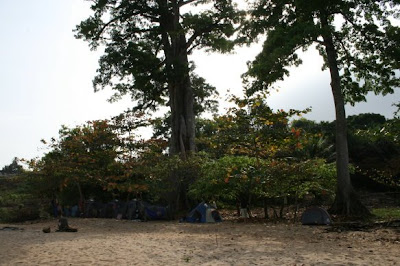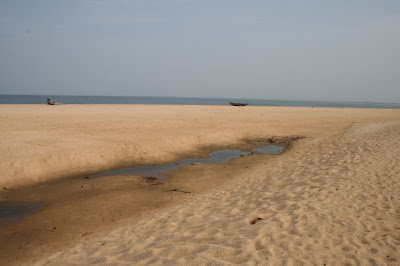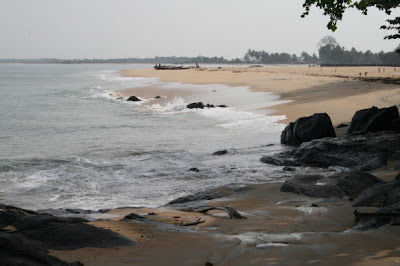
Our tents were set up under the Bilbao tree. There was no fresh water but was a drop toilet (squatting style) in the middle of the brush surrounded by a make-shift palm enclosure. It worked just fine for me.

The sand was bloody hot. We saw people doing unusual running and hopping leaps along a stretch and found it hilarious. Of course when we tried to walk on it ourselves (sans footwear) we found we were doing the same grooving moves. Ouch!

It was a relaxing setting to be in. Hot sun, slightly cooler shade, and refreshingly cool water. I tried to stay in the ocean as much as possible. There were several body boards that people had brought, but after the first day I opted against the death defying section of waves where the surfers prefer.

There were so many times we all looked at each other and remarked how we were in a tropical paradise. It was too bad that is was so difficult to get there by public transport.

The grand hotel that faced the beach in the picture above must have been an absolute luxury getaway before the war. Now it was an empty shell facing the almost completely desolate beach that stretched for miles.

As we stood by the shell of a hotel one of the other campers was aware of having some curious local onlookers. It was a small town compared to Monrovia and I am sure we were the entertainment of the weekend. I know I would be fascinated too if the positions were reversed.
This particular person leaned towards me and said, "It sickens me how we are television to them". I was taken aback, and in somewhat unusual fashion, I had an abrupt come back (in what may have been a bit of an exasperated tone).
"Well, we watch them in the same way."
In hindsight what I wished I had said was, "we are the guests in their country. They can do whatever they please. Why don't you go over and actually chat with them. They are always friendly and up for meeting anyone. They're actually individual people you might like. Why on earth are you here in Liberia? With that attitude you should go home." A touch harsh?

This is one of my favourite shots. Eerie and other worldly.

The dugout canoes are reminiscent of First Nations canoes in Canada. These are purely functional and are piled high with fishing nets.

As we enjoyed our weekend I often thought of the 5 taxi drivers who we had hired to drive us to Robertsport. The journey had taken 5 hours on the Friday and we were returning the following day. They were somewhere in the town. Were they sleeping in their cars? Had they found some food? Did they have money to pay for it? It was strange how little we cared about them as long as they performed their function.
We were paying them US$80 a taxi round trip. It was probably more money than they could ever make in a day. Mercy Ships pays US$5 a day to local Liberians who come and work along side us everyday. So much for Fair Trade prices and global fair wages. Although, the fact that I am even paying to work on board the ship still boggles my mind.
But as Nigel and I chatted with the drivers through out the two days we sensed a growing regret that they had taken us on. None of them had driven the road before and had no idea their cars were not made for such a journey. Two were involved in an accident which meant all the profits would be sucked away. Was it worth it? It was clear the answer was "no" by the end.
Then there was the damaged car. Our taxi driver rents his car from the owner at $900 Liberian dollars (LD) per day. A trip in a public taxi is $15 Liberian dollars per person per ride. A private taxi ride to town is US$5. LD$60 = US$1.
Life is poverty and a hardship in ways that I will never understand as long as I have a passport to leave these countries that I visit or work in. I have the opportunity to do and become anything I want to. Most of the world does not no matter how determined and brilliant they are.
On the drive back the two Liberians in our car said that they would like nothing more than to make a lot of money and travel Europe. In Africa there was nothing for them...or at least in Liberia. I thought about this as we drove in silence for some time. This was a pretty fair dream, not even extravagant by Western standards. it was one of my many goals that I had partially begun. But for them it was a distant dream that would never materialize. Perhaps they knew it somewhere. Is hope more important?

The waves rolled in and out as I walked along. Someone kept pointing out to me that my skirt was getting wet as I hunched down to get a good picture. I didn't much care at all.

One funny reversal occurred when some UN troops were sauntering along the beach. They saw us (Western girls in bathing suits swimming) and began openly taking pictures (sometimes awkwardly close). It was a strange sensation to be on display as though I lacked depth and therefore must not notice or mind. I thought of all the Westerners I had seen doing the exact same thing to Liberians, Malawians, etc. Everyone thinks everyone else is exotic and wants to capture it on digital imagery so that we can all go back to communities with other people like ourselves and say, "look at what I saw and experienced in person".

The ride back to Monrovia was tense. There was a sense of urgency in the air. Our driver wanted to get back to his wife and 5 children. He was wrapped up in angst over the accident. And to make matters worse, the driver of the car who had been in the ditch was sitting beside me in the back. I eventually discovered that he was sticking very close to get his accident payout which was the entire US$80 dollars that we were paying our driver.
Our driver was speeding dangerously and there were several incidents where he slammed on his brakes and we were left gripping the seat in front of us for dear life. Evidentally he no longer cared and just wanted to get home as soon as possible.

The worst incident on our return trip occurred as we reached the paved section of the main road. Our driver decided that gunning it as fast as he could would be the best. Unfortunately this is where at least 5 police check points were set up. They were after nothing more than a bribe.
I noticed a police check point coming up and as we got closer I became aware we were not slowing down. I leaned forward, pointed, and said "police" to the driver. The barriers were across the road with a blatant "stop police" sign. Beyond that was a plank with nails coming out of it.
Our driver registered it all a bit late and slammed on his brakes. We were barely able to avoid the sign and managed to swerve around it just in time before skidding to a stop a couple feet from the nails.
Now, I am sure this didn't look good, but I also think the police officer manning the check point was on a major power trip. He started screaming at our driver (who continually grovelled and apologised) accusing him of trying to drive past without stopping. I tried to interject and point out the battered windshield, but was essentially told to shut up.
We were directed to pull ahead and park so the traffic backing up behind us could get through. We pulled up, and much to our bewilderment, found that our car was speeding away. Well, there's nothing like an adventure with an errant taxi driver in post-war Liberia! We looked back to see if we were being chased. Nothing. But we all knew there was another police check point up ahead.
The next one we stopped for. And yes, they had been alerted to us. But as we had experienced in previous check points, as soon as you say you are a volunteer with Mercy Ships the smiles break out and you are welcomed and allowed to pass (with a bribe from the driver, of course). He only received a small, verbal slap on the wrist.

Why are some of the most beautiful places those where its own people can barely feed themselves from day to day while wealthy foreigners sweep in and suck up only the pleasure of life there?


The beaches were covered in these. I looked closely at them and discovered they were used in our budgie cages growing up so the bird had something to sand his beak on. A New Zealander told me it was part of a fish.


Ah, relaxation. I, a Western woman, take a moment to guiltily relax in the natural luxury of a country so impoverished and torn apart by war, its after effects, and the physical scars and losses. How lucky I am to be born by complete chance where I was.
Blessed are the poor, for theirs is the kingdom of heaven.














































